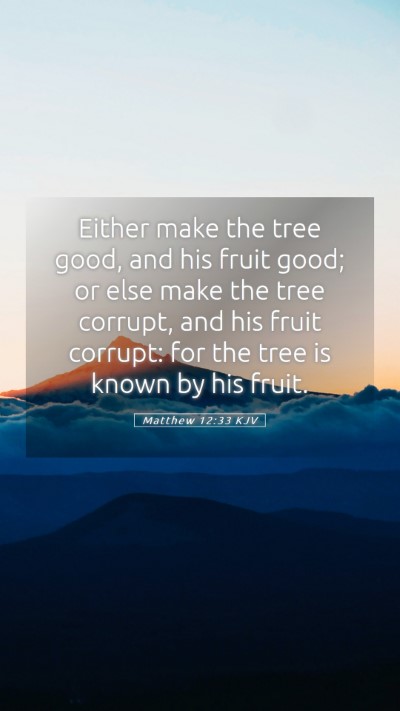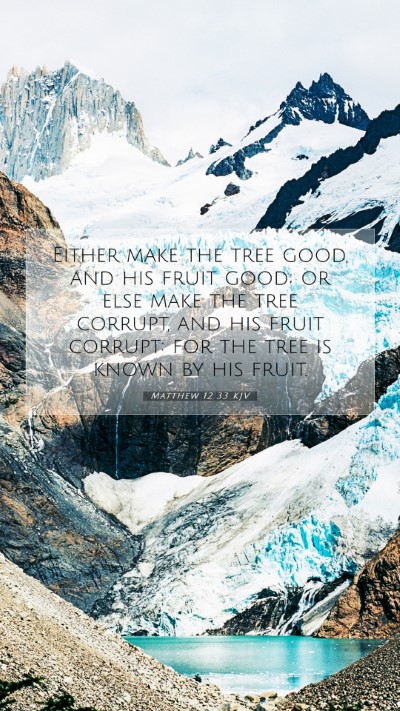Understanding Matthew 12:33
Matthew 12:33 states: "Either make the tree good, and his fruit good; or else make the tree corrupt, and his fruit corrupt: for the tree is known by his fruit." This verse serves as an important teaching of Jesus, highlighting the relationship between a person's character and their actions. Below is an analysis of its meaning drawn from various public domain commentaries.
Bible Verse Meanings Explained
This scripture is pivotal in understanding not only Jesus’ teachings but also the nature of good and evil. According to Matthew Henry, the "tree" symbolizes a person's heart or character, while the "fruit" represents their actions or behavior. This metaphor suggests that a person’s true nature is revealed in their actions.
Albert Barnes elaborates that making a tree good entails nurturing a virtuous character that produces positive actions. Conversely, making it corrupt signifies fostering a base nature resulting in immoral actions. Thus, the fruit serves as a direct indication of the tree's quality, emphasizing that genuine goodness must come from a good heart.
Adam Clarke provides insight into the cultural context of agricultural societies, where trees and their fruit were vital to daily life. In this analogy, just as one can discern the quality of a tree by its fruit, so can one evaluate a person's morality by observing their actions. This highlights the ethical dimension of Jesus' teaching - one cannot claim to have a good heart while producing bad actions.
Bible Verse Interpretations
This verse encapsulates the principle of integrity; what one professes must correspond to what one practices. Henry notes that it serves as a caution against hypocrisy among believers, urging them to reflect on whether their actions align with their stated beliefs. Barnes agrees, suggesting that self-examination is crucial for those who wish to live righteously.
In-Depth Bible Verse Analysis
The essence of Matthew 12:33 can also be observed in its appeal to discernment. Jesus calls for a critical evaluation of both oneself and others, as Clarke points out that good actions stem from a good disposition. In a broader sense, this verse invites believers to consider their own lives and the authenticity of their faith.
Application of Bible Verses to Daily Life
- 1. Self-Reflection: Regularly assess your actions to ensure they reflect your beliefs.
- 2. Community Involvement: Engage in community service to produce good "fruits."
- 3. Teaching Integrity: Lead by example to encourage others in ethical living.
Related Bible Cross References
- Luke 6:43-45 - “For a good tree bringeth not forth corrupt fruit…”
- James 3:12 - “Can the fig tree, my brethren, bear olive berries?”
- Galatians 5:22-23 - “But the fruit of the Spirit is love, joy, peace…”
Conclusion
Matthew 12:33 offers profound insights into the nature of morality and ethics, encapsulating the necessity of aligning one's inner beliefs with outer actions. By understanding this scripture, individuals can gain a deeper appreciation of the importance of producing good ‘fruit’ in their lives.
This verse encourages a comprehensive exploration and exegesis of not just its content but its implications for personal faith and community interaction. Such explorations contribute to more meaningful participation in Bible study groups and aid in nurturing a vibrant faith community.


